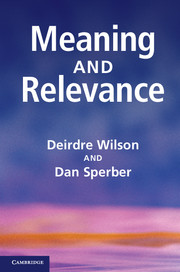1 - Introduction
pragmatics
Published online by Cambridge University Press: 05 June 2012
Summary
Pragmatics is often described as the study of language use, as opposed to language structure. In this broad sense, it covers a variety of loosely related research programmes ranging from formal studies of deictic expressions to sociological studies of ethnic verbal stereotypes. In a more focused sense – the one we will use here – pragmatics contrasts with semantics, the study of linguistic meaning, and is the study of how contextual factors interact with linguistic meaning in the interpretation of utterances. Here we will briefly highlight a range of closely related, fairly central pragmatic issues and approaches that have been of interest to linguists and philosophers of language in the past thirty years or so. Pragmatics, as we will describe it, is an empirical science, but one with philosophical origins and philosophical import.
References to pragmatics are found in philosophy since the work of Charles Morris (1938), who defined it as the study of the relations between signs and their interpreters. However, it was the philosopher Paul Grice’s William James Lectures at Harvard in 1967 that led to the real development of the field. Grice introduced new conceptual tools – in particular the notion of implicature – in an attempt to reconcile the concerns of the two then dominant approaches to the philosophy of language, Ideal Language Philosophy and Ordinary Language Philosophy (on the philosophical origins of pragmatics, see Recanati 1987, 1998, 2004a, 2004b). Ideal language philosophers in the tradition of Frege, Russell, Carnap and Tarski were studying language as a formal system. Ordinary language philosophers in the tradition of the later Wittgenstein, Austin and Strawson were studying actual linguistic usage, highlighting in descriptive terms the complexity and subtlety of meanings and the variety of forms of verbal communication. For ordinary language philosophers, there was an unbridgeable gap between the semantics of formal and natural languages. Grice showed that the gap could at least be reduced by drawing a sharp distinction between sentence meaning and speaker’s meaning, and explaining how relatively simple and schematic linguistic meanings could be used in context to convey richer and fuzzier speaker’s meanings, consisting not only of what was said, but also of what was implicated. This became the foundation for most of modern pragmatics.
- Type
- Chapter
- Information
- Meaning and Relevance , pp. 1 - 28Publisher: Cambridge University PressPrint publication year: 2012
- 8
- Cited by



